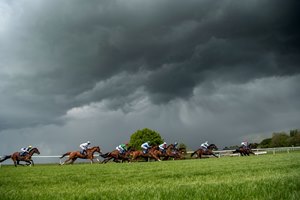BHA Proposal Calls For Reduced Fields, Veteran Jockeys


Field sizes will initially be restricted to a maximum of 12 runners, and only senior jockeys will be allowed to participate under the latest plans revealed by the British Horseracing Authority for the resumption of racing in Britain.
Both measures follow risk assessments designed to minimize the potential for injury and reduce any potential pressure on the National Health Service, a key consideration in racing's proposals to restart the sport following its stoppage since March 18 as a result of COVID-19.
The moves would also allow for better social distancing, an issue that was raised in specific relation to racing by culture secretary Oliver Dowden during a select committee session April 22, as will a limit on people attending more than one fixture a day.
In a letter to trainers, the BHA also acknowledged that such restrictions would lead to increased competition for places in the reduced fixture list, particularly for lower-grade horses.
"This (proposal) is based on risk modeling, which indicates that field sizes of 12 or fewer reduces the risk to participants on the track and assists with social distancing requirements at the racecourse," The BHA said. "We have taken in a similar risk mitigation approach in relation to jockeys. Consequently, only the more senior jockeys will be able to ride under initial plans. This will be reviewed continually.
"We recognize (field-size restrictions) will increase competition for places, so we plan to extend the number of races on a card, including by staging more divisions. Even though we intend to provide a balanced program, it is likely that due to competition for places, some horses, particularly those that are lower rated, may find it difficult to get a run in the early stages of resumption."
Last week, the BHA extended the suspension of British racing from its initial restarting point of May 1 to an unspecified date, as well as outlining that no spectators would be permitted until June at the earliest.
A number of plans have been put forward for resuming racing, including the use of hub racecourses, such as Newmarket, Lingfield, and Newcastle, where those needed to run a fixture—such as jockeys, stable staff, and officials—could stay close by or onsite in hotels.
The BHA resumption of racing group is "not ruling out any model for resumption," and both flat and jumps courses are soon to be asked to apply to host fixtures and demonstrate they are able to potentially operate under strict risk-management and infection protocols.
"On current planning, we anticipate that the early stage models for resumption would allow for horses to race behind closed doors under strict conditions at locations which meet specific criteria around risk mitigation and infection control," the BHA letter said. "Once finalized, these criteria will be used to identify which racecourses may, in principle, be able to fulfill the safety requirements of racing behind closed doors under the strictest resumption models."
Behind-closed-doors racing is set to restart in Germany and France early next month, with Ireland running a similar system when the sport restarts there. Brant Dunshea, the BHA's chief regulatory officer and chair of the resumption of racing group, is due to meet officials from those racing nations next week to discuss their plans.
The classics in France and Germany have been rescheduled as part of the reformed racing programs. In Britain, under a "best-case scenario," the Two Thousand Guineas (G1) and One Thousand Guineas (G1) will take place in early June, and the Investec Oaks (G1) and Investec Derby (G1) in early July, with certain trial races for each rescued by the BHA and run in the second half of May.
Alongside this, the BHA outlined in its letter that "the intention is to keep the race program as close to normal as practicable" providing racing for all classes and ages of horse, including 2-year-olds.
A fixture list for the first two months of racing after resumption will be published "within the next fortnight," according to the regulator, providing a "sense of how the calendar would look" when racing comes back.
The BHA reiterated that with betting shops closed and no income from crowds, however, prize money for races when the sport returns will be affected.
The letter said: "As explained in our previous update, with no income from crowds and the potential continued closure of betting shops, racecourse revenues will be significantly reduced, which means there will be a greater reliance on the Levy Board to meet the costs of resuming racing.
"As well as reducing the number of fixtures that we can afford to stage, this will inevitably impact prize-money values. We can't provide exact figures on this yet, and we are still exploring various options that might be available to support or supplement prize money until crowds return and/or betting shops reopen."
